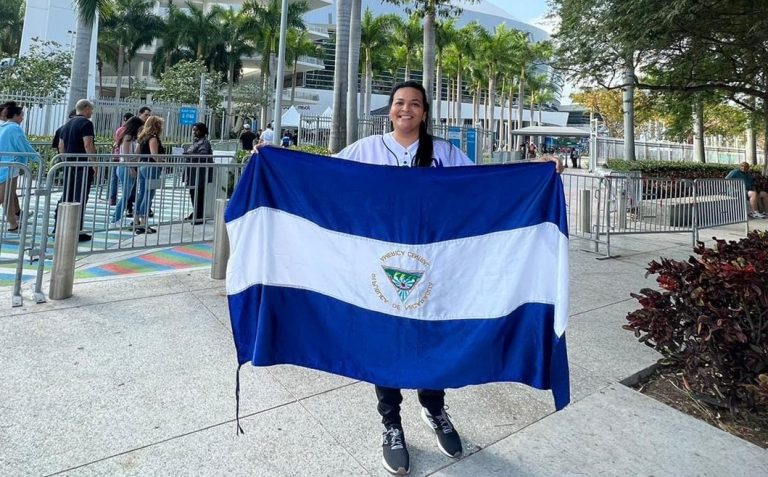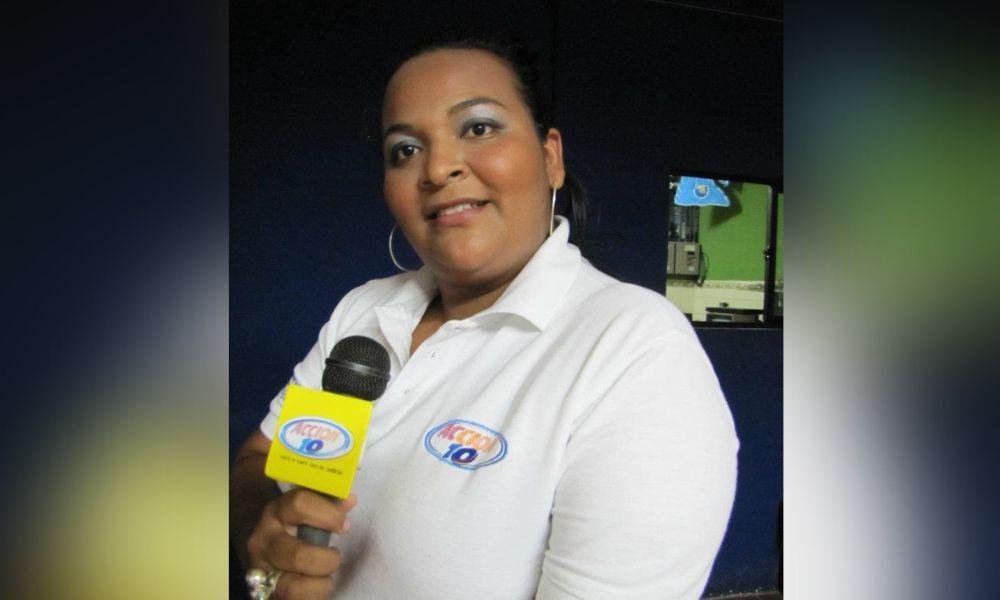18 de julio 2023

Children of Exile: The Births “Sowing Hope” in the Camp of Nicaraguan Farmers

PUBLICIDAD 1M
PUBLICIDAD 4D
PUBLICIDAD 5D
The reporter's lawyers launched a campaign for Nicaraguan personalities to attest to the risks involved in practicing journalism in Nicaragua

Joselin Montes Gonzalez, Nicaraguan journalist detained in the United States. / Photo: Courtesy
Nicaraguan journalist Joselin Nazareth Montes Gonzalez is being held in a cell at Broward Transitional Center in Pompano Beach, Florida. Her deportation trial is scheduled for August 28, 2023. The Nicaraguan Human Rights Defense Office is promoting a campaign against the clock to stop her deportation.
The campaign consists of having Nicaraguan personalities, former political prisoners, and association leaders testify to the risks of exercising journalism in Nicaragua and explain why Montes cannot return to the country, explained Pablo Cuevas, Director of the Nicaraguan Human Rights Defense Office.
Former political prisoners Felix Maradiaga and Medardo Mairena have already pledged to testify. In addition, they are holding conversations for support from eight US Congresspeople.
The testimonies will be attached to Montes’ file, in which the defense details that the journalist has basic nursing knowledge and that, during the social outbreak of 2018, she cured wounded protestors from the repression in her native Chinandega.
The objective of these testimonies is for the judge to be made aware of the essential details of Montes’ case and to consider them when deciding “whether to order deportation or whether to grant the asylum request presented by her lawyers,” explained Cuevas.
At the HR Defense Office, “we prepared a document where we tell her story, narrate the rights violated, such as freedom of expression, and point out that she is a victim of forced displacement, which is a crime against humanity,” notes Cuevas.
Monte has been detained at the Broward Transitional Center in Miami since April 18, 2023. The deportation trial was scheduled for May 17, but her lawyer did not attend, and the judge rescheduled it for July 5th. However, this time, the attorney requested to reschedule the hearing for August 28, and the judge agreed. Cuevas considers this “the result of all the effort made.”
Montes, 33, arrived in the United States illegally on January 4, 2023, fleeing persecution by the regime of Daniel Ortega and Rosario Murillo. After crossing the Rio Grande, she surrendered to immigration authorities in Texas and began a rather complicated process.
The heart of this problem is that in March 2016, she traveled with a tourist visa to Houston, Texas, and stayed six months in the US. Upon leaving for Nicaragua, US immigration officials at the airport questioned her on why she had in the country for so long. She became quite nervous, so the officers canceled her visa. This situation is considered deportation.
Montes did not realize the seriousness of what happened in 2016, and at the beginning of this year, she decided to return irregularly. This time to request political asylum due to the persecution against her, but she ran into a legal barrier.
According to the human rights defender, when the journalist entered the United States, she was given the condition of calling immigration daily. However, on February 24, they issued her “a closed deportation order” and put a shackle on her right ankle to control her movements.
“I offered her to start her legalization process, but it is difficult in this part of the world because people have to work to subsist, and I assume that because of this, she could not finish her story and did not present it to this office,” comments Cuevas.
On April 18, while opposition Nicaraguans were commemorating the fifth anniversary of the social uprising, Montes attended an appointment with the US Immigration and Customs Enforcement Office (ICE), where she was detained and transferred to the Broward, Florida facility.

According to Cuevas, efforts were made during this time for the journalist to respond to the deportation process in freedom, but the judge denied her the right to bail. Her family and friends had even lent money to pay the bail, but the judge rejected this possibility.
Montes’ friends also staged a sit-in on June 30 at Calle Ocho in Miami, located at 762 A SW 18th Ave so that the judge would consider the journalist’s risk situation in Nicaragua.
For his part, Cuevas keeps the hope alive that the deporting officer will let the journalist respond to the process in freedom. He warned that on July 5, he asked Montes’ lawyer for a birth certificate and other documents that should have been presented on July 10, so he emphasized “there is a possibility.”
Montes, a native of Chinandega, studied journalism at the Universidad de Managua. She began her professional career doing internships at the local channel in Chinandega, where she was later hired. Simultaneously, she was a correspondent for Channel 10, a national television channel.
During the 2018 social outbreak in Nicaragua, Montes joined the protests and even volunteered in a medical brigade called “Alvarito Conrado.” Since then, she was put under surveillance by regime sympathizers, who even publicly accused her of trying to burn down the Chinandega mayor’s office and of wanting to assassinate the department’s political secretary, Jose Manuel Espinoza.
The journalist was forced to resign from both television stations and took refuge on a farm on the outskirts of Chinandega for two years. Then she moved to Masaya for another two years. “I was going from one place to another,” she said in an interview with Despacho 505 last March.
At the end of 2022, Montes decided to travel to the United States, but she didn’t arrive until January 4, 2023. In that country, she settled in Miami, where her spouse and a group of friends accompanied her throughout this process.
This article was originally published in Spanish in Confidencial and translated by Havana Times.
PUBLICIDAD 3M
Confidencial es un diario digital nicaragüense, de formato multimedia, fundado por Carlos F. Chamorro en junio de 1996. Inició como un semanario impreso y hoy es un medio de referencia regional con información, análisis, entrevistas, perfiles, reportajes e investigaciones sobre Nicaragua, informando desde el exilio por la persecución política de la dictadura de Daniel Ortega y Rosario Murillo.
PUBLICIDAD 3D